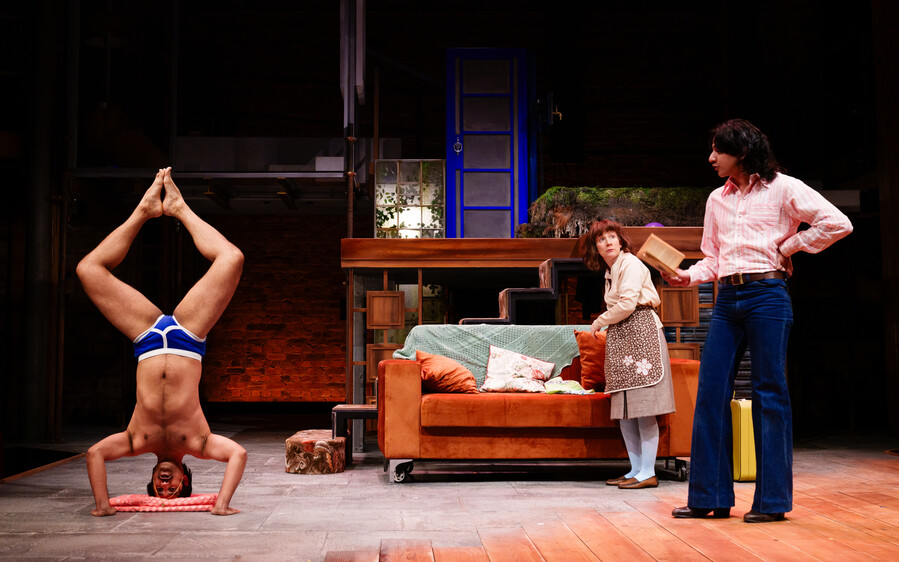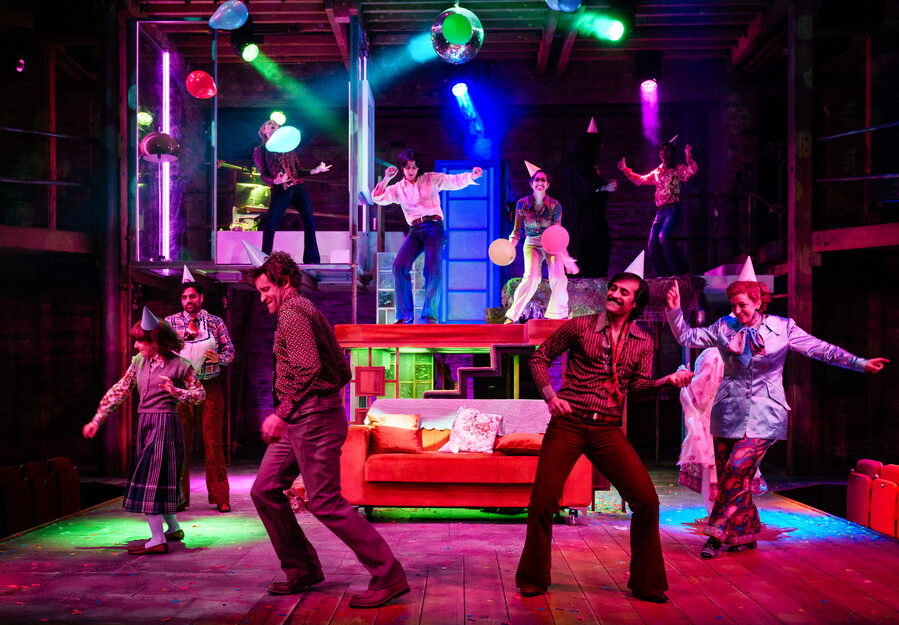
24 April – 1 June
Hanif Kureishi’s debut novel The Buddha of Suburbia is set in the 1970s, an era that’s widely disregarded or dismissed for its garish (lack of) taste. Or, maybe worse, those years are simply regarded as an unhappy, strike-filled interim between the pastel dreaminess of the late 60s and the iron Thatcherite 80s.
Yet Emma Rice’s sparkling stage adaptation and direction of The Buddha at the Swan, Stratford, shows beyond doubt that the 1970s deserve to be reclaimed. They were filled with life, love, laughter, dance, and great music. Also racial tension that sometimes erupted into violence, class inequality, and struggles over sexuality and gender roles. Into that mix throw a talented, questioning adolescent and watch him negotiate his way through the rapids.
The adolescent is Karim Amir, ‘an Englishman born and bred, almost’. The ‘almost’ is key. Karim’s father is Indian, his mother English. He’s 17 when the action opens in 1976 and, as well as the standard adolescent angst, he must deal with racist abuse at school – treated as quite standard – and worries over his parents. Father Haroon is the titular Buddha. He comes from a well-to-do Indian family but, in England, he’s a lowly clerk in the Civil Service. Karim’s mum is Margaret, mostly timid and compliant but inclined to get upset in case the neighbours are watching when Haroon does yoga in his underpants.
Karim has two more families to observe and to run to in times of stress. One is artistic Eva’s. The other is Anwar’s. Anwar, married to Jeeta and father to Jamila, is Haroon’s best friend from those idyllic childhood days in India. He and his wife own a grocery. To complicate things, Haroon and Eva are having an affair, while Karim and Jamila – Creamy and Jammie to each other – enjoy regular bouts of sex. That is, until Jammie’s father arranges for the free-spirited teenager to be married to the much older Changez, an Indian whose idea of England is based on Sherlock Holmes and P.G.Wodehouse. ‘Which way is home?’ says one of the characters at one point. He means, which direction is my house in? But the remark could so easily apply to any of the first-generation arrivals from India to England.
The scene is set, then, for compromises and clashes involving race, culture and sex. Rice’s adaptation, made in collaboration with Kureishi, treats these potentially weighty topics with gentle irony and good-natured humour. There are a few moments when the action turns dark, above all when National Front thugs set upon the hapless Changez. And in the background is the constant thrum of verbal abuse and worse faced by immigrant families. On a lighter note, there is satire when Karim begins to realise his dream of becoming an actor.
The satire is another strand, one which takes up most of the second half of the play and one which the entire cast of The Buddha take especial delight in: actors poking fun at actors. The controlling ‘radical’ director Matthew Pyke, suavely embodied by Ewan Wardrop, is inclined to start rehearsals with statements like ‘What a strange business acting is.’ His fawning company rush to lend him their pens, their smiles, even their bodies if necessary. Amir has already played Mowgli for another director in an adaptation of Kipling. Dressing up in a loincloth and slathering himself all over with brown goop was demeaning enough. Now channelling the characters of Anwar or of Changez for Pyke’s improvisational company will raise questions of appropriation and truthfulness.
But if the Indians generally appear to the white English as stereotypes, the characters in this Swan production appear in the round. We can see both the innocence and the absurdity of Changez – a vulnerable Raj Bajaj – as he tries to reconcile his traditional, bookish view of England with the reality unfolding before his eyes. The central figure of Karim Amir, in a thoroughly engaging performance from Dee Ahluwalia, is confused, energetic and ever hopeful. Natasha Jayetileke captures the pride and frustration of Jamila, the girl who wants to be Simone de Beauvoir but finds herself cast as the traditional Indian bride.
Bettrys Jones plays downtrodden mum Margaret and, slightly disconcertingly, doubles as Eleanor, Amir’s love interest in the acting company. Ankur Bahl is the suburban Buddha himself, whose words of wisdom and flexible yoga moves bring a touch of exoticism to English sitting-rooms, such as the one belonging to the bohemian Eva (Lucy Thackeray). Particular mention should be made of Tommy Belshaw, making a striking debut as Charlie, the Bowie-like school crush of Amir, who will go on to success and doom as a rock star in New York. Rina Fatania runs the gamut from traditional Jeeta to the free-living and -loving Marlene, while Simon Rivers makes a truculent Anwar before encountering a comically implausible cause of death.
As well as death, there’s quite a bit of sex in The Buddha of Suburbia, realised ingeniously with the aid of the odd melon, a couple of bananas and multiple party poppers. Above all, there is the music. The period stretches from the end of the hippy era to the beginning of punk, with disco acting as a kind of bridge. The soundtrack to this stirring and heart-lifting production is provided by Joni Mitchell, the Bee Gees, and Joan Armatrading among many others. As we were going out, I heard a member of the audience say ‘They’ve got a hit on their hands.’ I think that’s right.
★★★★★ Philip Gooden 1st May 2024
Photo credit: Steve Tanner


